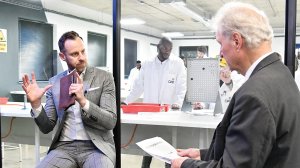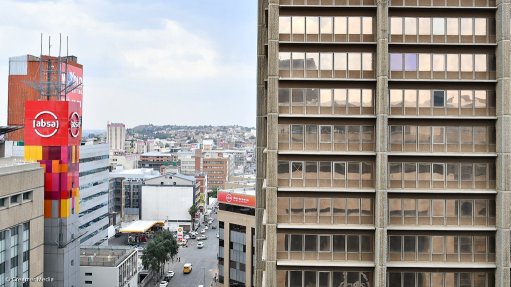AIE is redefining engineering education as legacy N-programmes are phased out

AIE CEO Leon Smalberger (left) interviewed by Engineering News & Mining Weekly’s Martin Creamer.
Engineering education is entering a new era in South Africa as the Department of Higher Education and Training starts the long-delayed phase-out of legacy N1 to N6 qualifications to introduce industry-aligned occupational qualifications.
During this chaotic time, Midrand-based higher education institute Academic Institute of Excellence (AIE) has stepped in to help aspiring engineers avoid suboptimal education pathways.Speaking in a video interview with Engineering News & Mining Weekly publishing editor Martin Creamer, AIE CEO Leon Smalberger said the changes will have a profound impact over the next 12 months, leaving a whole generation of National Accredited Technical Education Diploma- (NATED-) qualified engineers with more questions than answers.
First introduced nearly 50 years ago, the N-programmes once served as a key entry point for technically minded students, particularly those who did not take the necessary mathematics or physical science subjects at high school level.“However, the NATED qualifications are no longer relevant to the current job market, focusing less on practical implementation and more on theory,” explained Smalberger.
The retirement of the N-programmes has been delayed but there is finally movement and real commitment to make way for a new, updated framework of qualifications.“But that does leave a few challenges,” advised Smalberger, who also pointed out a long-standing problem with professional recognition.
“What most people don’t know is that the NATED qualifications have never been recognised by the Engineering Council of South Africa (ECSA). In other words, a student going through all the trouble of qualifying was never able to register as a professional engineer, and it is for that reason that these qualifications are phasing out.”
Bridging the Gap
Shifting from NATED to industry-aligned occupational qualifications is creating a void that needs to be dealt with over the next few years.
Smalberger said AIE anticipated the transition and has already introduced new solutions to ensure a viable pathway for engineering students amid the changeover.
This involved embarking on two massive projects many years ago.While the NATED qualifications allowed a qualified artisan to continue their studies into engineering, that is no longer going to be possible. In response, AIE has created a faculty for artisans.
“The new occupation-based trade qualifications from the Quality Council For Trades and Occupations have been implemented based on the new system, giving the NATED learners, possible engineers, a space to go,” shares Smalberger.
To address the second half of the problem, AIE embarked on a major process of developing professional engineering qualifications about seven years ago, in collaboration with ECSA.
“Today, we’ve released around eight professional qualifications as part of our new faculty of engineering, with another seven or eight qualifications in the pipeline,” explained Smalberger.
This new generation of qualifications was designed to ensure a clear, accredited pathway for students navigating the void.
“We have ensured that we have a viable product base and viable programmes. We have invested massively in infrastructure, learning methods and techniques, and will continue to do so,” he added.
Addressing Capacity and Accessibility
Capacity constraints at South Africa’s public universities have long limited access to engineering education and can be divided into three categories – physical infrastructure, lack of learning flexibility and access to specialised infrastructure.
Smalberger believes that AIE’s hybrid learning model, which blends in-person and online learning, can help to alleviate these pressures.
“Campus-based infrastructure will change and must change to cater for students that no longer need to access a traditional class with a lecturer, but need access to specialised infrastructure.
”Over the next 12 months, Smalberger points to AIE investing in infrastructure that will be unique in the market – potentially equating to some of the largest investments from a private institute, specifically related to engineering.
A Call to Students and Industry
Smalberger reminds prospective students that they have options, urging them not to lose sight of their goals during the transition period.
“Whether you’ve made the wrong choices in subjects at school or you did not get into the institute of your choice, there are viable options available.
Please come and talk to us, and we will guide you. Don’t change your dream.
”He also called on the engineering industry to strengthen collaboration with education providers, such as AIE.
Article Enquiry
Email Article
Save Article
Feedback
To advertise email advertising@creamermedia.co.za or click here
Press Office
Announcements
What's On
Subscribe to improve your user experience...
Option 1 (equivalent of R125 a month):
Receive a weekly copy of Creamer Media's Engineering News & Mining Weekly magazine
(print copy for those in South Africa and e-magazine for those outside of South Africa)
Receive daily email newsletters
Access to full search results
Access archive of magazine back copies
Access to Projects in Progress
Access to ONE Research Report of your choice in PDF format
Option 2 (equivalent of R375 a month):
All benefits from Option 1
PLUS
Access to Creamer Media's Research Channel Africa for ALL Research Reports, in PDF format, on various industrial and mining sectors
including Electricity; Water; Energy Transition; Hydrogen; Roads, Rail and Ports; Coal; Gold; Platinum; Battery Metals; etc.
Already a subscriber?
Forgotten your password?
Receive weekly copy of Creamer Media's Engineering News & Mining Weekly magazine (print copy for those in South Africa and e-magazine for those outside of South Africa)
➕
Recieve daily email newsletters
➕
Access to full search results
➕
Access archive of magazine back copies
➕
Access to Projects in Progress
➕
Access to ONE Research Report of your choice in PDF format
RESEARCH CHANNEL AFRICA
R4500 (equivalent of R375 a month)
SUBSCRIBEAll benefits from Option 1
➕
Access to Creamer Media's Research Channel Africa for ALL Research Reports on various industrial and mining sectors, in PDF format, including on:
Electricity
➕
Water
➕
Energy Transition
➕
Hydrogen
➕
Roads, Rail and Ports
➕
Coal
➕
Gold
➕
Platinum
➕
Battery Metals
➕
etc.
Receive all benefits from Option 1 or Option 2 delivered to numerous people at your company
➕
Multiple User names and Passwords for simultaneous log-ins
➕
Intranet integration access to all in your organisation



















